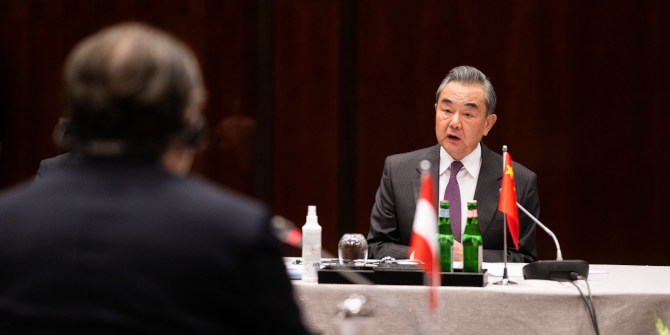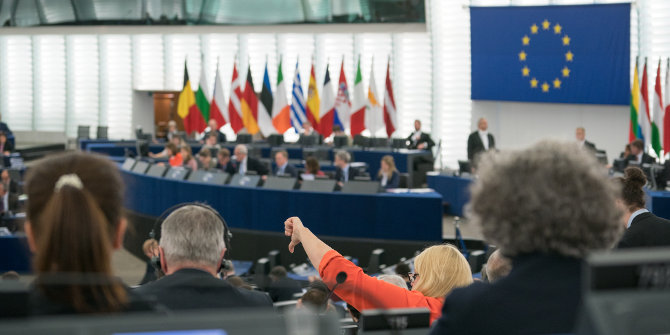 Former Bosnian Serb general, Ratko Mladić, has been found guilty of genocide and war crimes at the International Criminal Tribunal for the former Yugoslavia (ICTY). Reacting to the verdict, Denisa Kostovicova states there is broad consensus that the work of the ICTY has not translated into reconciliation among the affected communities in the Balkans. However, it is problematic to judge the legacy of decades of work by the international criminal court based on a single benchmark such as reconciliation, and a better response would be to assess what obstacles exist to facilitating reconciliation and how communities in the Balkans can now move forward.
Former Bosnian Serb general, Ratko Mladić, has been found guilty of genocide and war crimes at the International Criminal Tribunal for the former Yugoslavia (ICTY). Reacting to the verdict, Denisa Kostovicova states there is broad consensus that the work of the ICTY has not translated into reconciliation among the affected communities in the Balkans. However, it is problematic to judge the legacy of decades of work by the international criminal court based on a single benchmark such as reconciliation, and a better response would be to assess what obstacles exist to facilitating reconciliation and how communities in the Balkans can now move forward.

Ratko Mladić at the ICTY on 22 November (published with permission from the ICTY)
In the closing statement of the trial of former Bosnian Serb Army general, Ratko Mladić, at the International Criminal Tribunal for former Yugoslavia in The Hague, the prosecutor set his expectations uncompromisingly. He demanded a life sentence for Mladić so as not to insult ‘the victims, living and dead’.
No lesser sentence was deemed appropriate for this ‘master of life and death’ in Bosnia, who was charged with 11 counts of genocide and war crimes for the worst atrocities on European soil since World War Two. Around a hundred thousand people were killed, and over two million left their homes during the Bosnian war from 1992-1995.
And what a master he was. He himself picked the neighbourhoods of Bosnia’s capital Sarajevo to be shelled mercilessly by Bosnian Serb forces in the three-year-long siege; he efficiently delivered on the directive to make life ‘unbearable’ in the eastern Bosnian enclaves of Srebrenica and Zepa; he reassured people of Srebrenica of their safety, as the killing of some 8,000 Bosnian Muslim men and boys was about to get under way.
In fact, it was the violence that took place under his command throughout Bosnia that triggered the establishment of the ICTY in 1993. UNSC Resolution 827 refers to “reports of mass killings, massive, organized and systematic detention and rape of women, and the continuance of the practice of “ethnic cleansing”, including for the acquisition and the holding of territory.” Now, 22 years after the end of the war, of which Mladić spent nearly 16 in hiding, the judgment has arrived.
It was a life sentence, and a guilty verdict for all but one count of the indictment. The sentence will bring some satisfaction to all victims, though the pain remains theirs forever to bear. Questions will undoubtedly be raised over why the genocide charge was not upheld in the case of six of Bosnia’s municipalities, from where members of the Bosnian Muslim and Bosnian Croat population were removed, detained, tortured, sexually abused and killed. Nonetheless, the ‘butcher of the Balkans’, as Mladić came to be known, stood accused of the worst crimes that can be committed: genocide, crimes against humanity and violations of the laws or customs of war. The harrowing details the presiding judge Alphons Orie recounted were a reminder of the brutality of those crimes against women and men, young and old. But the Mladić verdict is a lesson that will travel beyond the Balkans: it is a clear message to what is not permissible in war and for what a price will be paid.
Benchmarks of success
The Mladić verdict was the penultimate verdict before the International Criminal Tribunal for the former Yugoslavia in The Hague wraps up its work after 24 years of its existence. While it may have taken some time for this experiment with international criminal justice to get into gear, on the eve of its closure it will have sentenced over 80 war criminals over nearly 11,000 trial days.
Justice has been slow and pain-staking, as minutiae of evidence was being dissected and contested by the prosecution and the defence teams in a series of trials for violence of unimaginable brutality and proportions in the Balkan wars. It has resulted in the establishment of legal facts about committed war crimes and responsibility for them.
But, there is consensus that the work of the Hague court has not translated into reconciliation among the affected communities in the Balkans, based on the acceptance of those facts. This view is shared by experts, the international tribunal’s officials, and even by a war criminal who has served his ICTY sentence.
It is erroneous, and not just simplistic, to judge the legacy of the decades of work of the international criminal court based on a single benchmark, such as reconciliation. After all, the court will leave behind a complex legacy on many fronts: in the Balkans, it has transformed the debate about war crimes and responsibility, which would not have taken place without it; it showed that even the most powerful cannot escape justice; it allowed victims to see justice being done; it established a historical record of one of the most tumultuous periods in the region; it led to changes in international jurisprudence, such as in the area of sexual violence, to name just a few.
But, it is the issue of reconciliation, or, more precisely, failed reconciliation, that captures the minds of observers. The biggest danger in the aftermath of the Mladić verdict is to accept the premise that international criminal justice may bring some solace and satisfaction to the victims and survivors of unspeakable crimes, but that it ultimately cannot – nor should it be expected to – bring about reconciliation among communities in the Balkans. Rather, more probing questions are in order: chiefly, where are the obstacles to reconciliation? And what is to be done about it?
Spaces of reconciliation
In the run-up to the Mladić verdict, it was clear that whatever the outcome, it would be interpreted through an ethnic lens. Such conflicting interpretations ostensibly show that justice cannot pave the way for communities to face a violent past and move forward.
There is by now a well-known mechanism that achieves this purpose: responding to the individualisation of responsibility that is a defining premise of criminal justice and implicating an entire nation in culpability for war crimes. For example, the Bosnian Serb press ran a headline that the sentence for Mladić is a sentence for all Bosnian Serbs. Another Bosnian Serb official said that his sentence was bound to be unjust, but that Mladić ‘would always be a Serb hero.’
This has now become a well-rehearsed script in response to landmark verdicts. Not so long ago, we saw it at work in response to the genocide verdict of war time Bosnian Serb political leader Radovan Karadžić. Such rhetoric divides communities throughout the Balkans. But does it mean that there is no prospect for reconciliation – even if we take reconciliation to mean nothing more than working together to address past wrongs?
The reality on the ground, among the ordinary people who have suffered the worst, tells a different story. Those who have suffered come together across-ethnic lines, united by their shared experience of suffering to deal with the painful issues of the past. In some communities, both in Bosnia and Kosovo, they get together secretly at a local level – so as not to be seen by the authorities – to discuss the past and help each other.
In my recently published study of a regional civil society initiative that includes all ethnic groups in former Yugoslavia, I found that people focus more on issues of peace, reconciliation and solidarity when they meet at a regional level as opposed to a national level. The initiative, known by its acronym RECOM, advocates the establishment of a regional record of the facts of war crimes and other human rights violations.
To point out these initiatives is not to minimise the sources of exclusive ideologies and nationalism in everyday life. But we need to be aware of alternatives, too. The openings for some form of accommodation exist at a local and regional level; while the obstruction both in terms of the absence of concrete action to address impunity and attempts to moderate extreme discourse exists at the national level.
We know much too well from the Balkan experience that words have power. It is very easy to slip from saying that there has been no reconciliation to the belief that there cannot be any reconciliation. And it is even easier to blame the Hague tribunal for this.
Please read our comments policy before commenting.
Note: This article gives the views of the author, not the position of EUROPP – European Politics and Policy or the London School of Economics.
_________________________________
 Denisa Kostovicova – LSE
Denisa Kostovicova – LSE
Denisa Kostovicova is Associate Professor in Global Politics in the Department of Government and a Research Fellow at the Civil Society and Human Security Research Unit in the Department of International Development at the London School of Economics and Political Science. She is on Twitter @DenisaKost




